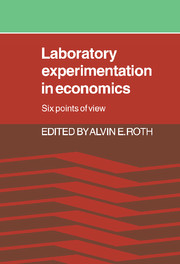Book contents
- Frontmatter
- Contents
- Acknowledgments
- List of contributors
- 1 Introduction and overview
- 2 Bargaining phenomena and bargaining theory
- 3 Equity and coalition bargaining in experimental three-person games
- 4 The psychology of choice and the assumptions of economics
- 5 Hypothetical valuations and preference reversals in the context of asset trading
- 6 Economics according to the rats (and pigeons too): what have we learned and what can we hope to learn?
- 7 Dimensions of parallelism: some policy applications of experimental methods
6 - Economics according to the rats (and pigeons too): what have we learned and what can we hope to learn?
Published online by Cambridge University Press: 24 October 2009
- Frontmatter
- Contents
- Acknowledgments
- List of contributors
- 1 Introduction and overview
- 2 Bargaining phenomena and bargaining theory
- 3 Equity and coalition bargaining in experimental three-person games
- 4 The psychology of choice and the assumptions of economics
- 5 Hypothetical valuations and preference reversals in the context of asset trading
- 6 Economics according to the rats (and pigeons too): what have we learned and what can we hope to learn?
- 7 Dimensions of parallelism: some policy applications of experimental methods
Summary
Introduction
It has been more than 10 years since we published our first experimental test of economic choice theory using animal subjects (Kagel et al., 1975) and even longer since we began conducting economic choice experiments with animal subjects (1971). We continue to be engaged in experimental studies with animal subjects, extending our inquiries beyond static models of consumer choice and labor supply behavior under certainty to choices among risky alternatives (Battalio, Kagel, and MacDonald, 1985) and intertemporal choice behavior (Kagel, Green, and Caraco, 1986). Although no other economists we know of have undertaken experimental studies of animal choice behavior (i.e., with their own laboratories), there is a growing dialogue between economists and psychologists concerned with investigating economic choice theories using animal subjects, as judged by the expanding number of research proposals and working papers involving such collaborative efforts. In addition, efforts by psychologists to design and analyze animal choice experiments with economic models (e.g., Lea, 1981; Hursh, 1984) have increased, as has the use of optimization theories in biology, borrowed more or less directly from economics and operations research, to analyze the ecological behavior of animals (Maynard-Smith, 1978). At the same time there has been a virtual explosion in economics of experimental studies of market behavior using human subjects (for reviews see Smith, 1982a; Plott, 1982) and a smaller number of studies investigating individual choice behavior with human subjects.
- Type
- Chapter
- Information
- Laboratory Experimentation in EconomicsSix Points of View, pp. 155 - 192Publisher: Cambridge University PressPrint publication year: 1987
- 9
- Cited by



